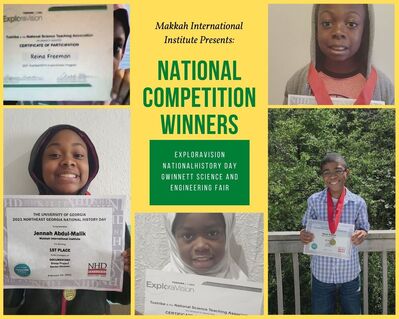 For the past few weeks, the students at Makkah International Institute have been working on the Exploravision, National History Day, and Science Fair Projects. Each grade level and every class has participated in the creation and perfection of their work to present in front of judges for evaluation. Every single individual project was based on a subject in those particular classes for example science classes did science related topics and ect. Both the Exploravision contest and the Science Fair, were science based projects while the National History Day was a historical research project. In physics, the students were asked to create a device or prototype of sorts that might aid in the treatment and or diagnosis of breast cancer, for the Exploravision project. The inspiration that grew from creation from this device led to it being submitted into the Science Fair Project as well by Jennah Abdul-Malik, tenth grade student at Makkah Institute, and I. The middle school students participated in the Green Roof Project for the Exploravision while the 4th/5th grade students worked on a soil erosion project The students overall did an excellent job at representing the muslim schooling community with their regional placements. The National History Day advancing students included; First place winners Salam Castor, Nazaha Bryant, Jennah Abdul-Malik with their documentary titled Uyghur Internment: A Lesson in Censorship, Romaris Baker in the junior division with his exhibition on the Stamp Act, Ameer Perkins, Nassir Khamis, Sahar Abdul-Mateen and Ibrahim Abdul-Malik with an exhibition about the Soldiers Propaganda during the Vietnam war, and lastly me, Christie Castor, in second place for the senior category for a paper about the legal repression of the African American people in the constitution. The students who are advancing in the science fair project includes; placing in third place, Jennah Abdul Malik and Christie Castor in the Biomedical Engineering; Middle schoolers Ibrahim Abdul-Malik and Ameer Perkins with their Environmental Engineering project and last but least Nassir Khamis and Khalil Bryant with a project dealing in Environmental Engineering as well. These students will be advancing into the state category of the competition, which essentially means they will be competing with more students over the state of georgia. We will be cheering on our students virtually as they hopefully continue to advance into great things! My personal experience regarding this competition is that it requires a lot of focus and dedication. The best way to personally achieve great things in terms of competitions is to put the best work that you and your group could possibly give out. My group personally, in regards to all our projects, we devoted a lot of time into thinking about the perfect solution to our problem. I would often observe as my other younger siblings would talk about their projects in class and I love seeing the dedication they put as children and teenagers, in important work that could possibly benefit the world in the best of ways. My team thought thoroughly about our topics and even actually debated its change but in the end we came to a decision that only benefitted us but gave us an edge. I cannot lie and say that it was not stressful having to watch as judges criticize the work that took almost a month to complete. Criticism is hard to take especially when everyone feels they put their best foot forward, with that being said, the placements that the students have in each contest shows that our effort is not going to waste. I think it is important to show the world that the students at Makkah Institute have the potential to achieve awesome things. Christie CastorMy name is Christie Castor, I am a student at Makkah Institute in the 12th grade. Though this is my first year enrolled in the Makkah International Institute, I am honored to be part of such dedicated group of muslim people who believe in the education and empowerment of young muslims. I am graduating this year in May, Inshallah, I hope I can take what I have learned from the Makkah Institute and into college with me.
2 Comments
 "FIRST THEY ignore you, then they laugh at you, then they fight you, then you win." These words of Nicholas Klein are often misattributed to Ghandi. But the misappropriation of one’s words are just one example of how the truth of things often becomes distorted. People believing something doesn't make it true. People ignoring you doesn't make you or your ideals irrelevant. People laughing at you doesn't make you incompetent. People fighting you doesn't make you worthy of being despised. Ultimately, the winning in all of the aforementioned is when the truth plainly and clearly shows itself and it can no longer be denied or resisted. The current truth I would like to deal with is the condition of those in the African Diaspora. The time for talking is past and action is the now the only alternative. There are many racial initiatives and programs going on these days and given my background in Anthropology, Philosophy, and Education, most people expect for me to be interested in or engaged with many of the seminars available on “race” right now especially those that are addressing the racism that exists in my religious group, the colorism among people in my tribe and other tribal levels of connection, and even the disparities on a larger community level that address the engagement of the "black" community with the modern day police force which has quite a complex history in this our United States of America. The main reason many will find me absent from discussions they might expect me to be present in, knowing full well how passionate I am about Afircan liberation across the entire Diaspora, is because I do not engage in conversations that ignore deeply examined, sensible premises in order to support conversations that can truly lead us forward. Educating our young people, ourselves, or even others outside of our cultural group about The African Diaspora experience must transcend above and beyond presenting information that begins at a historical view that only acknowledges Africans post European or post Arab contact. It is not sensible nor is it an honest approach to continue to pretend Africa was the “Dark Continent “ and nothing of value occurring there until outside contact. It is impossible to understand anything of any society in the Earth and not recognize the origin of organized society IS Africa. The first place for man to have a religious idea and expression for example to have the cognition and spiritual awareness to bury their dead happened in Africa first. The first Universities in the world exisited in Africa first and therefore were the first seats of Philosophical thought. Hippocrates, Socrates, and Plato all admitted that whatever knowledge they had they had garnered out of "Kemmet" (in Egypt) and brought it back to Greece, modified it, interpreted it and fit it to fit the back drop of the culture of Greco-Roman cultures. So when you want to talk to me about the plight of African people, understand that if you are not bringing me the whole story and with a clear lens through which not only to understand Africa of the past, present and future, I am unable to meet you where you stand. African culture and condition is much greater than a snippet of 700 years. I do not engage in conversations that merely talk about personalities and accomplishments of individuals without recognizing the long-term implications of long standing, vast kingdoms and their impact on the world and then subsequently them meeting their demise through a global phenomena that goes ignored constantly and therefore is the common and undeniable root and cause of the majority of the injustice and oppression currently in the world today. A true conversation about African liberation must address what happened and why and the part EVERYBODY has played in it because knowingly or unknowingly most everyone has had some involvement even if you have only been used unwittingly by the invisible hand of greedy and powerful governments. This is the age of information. Being educated is mostly a click away from any of us at anytime. If you are not a part of the solution, try not to be a part of the problem, and a big part of the problem is ignorance....being unaware. Many of the current seminars, initiatives. and series presented since the surge after the death of George Floyd have been beneficial to showcase certain public speakers, or met with glee by a staff (particularly in schools) who are required to spend a certain amount of dollars on professional developments yearly, and I'm sure plenty of money has been made. Bottom line, what has been accomplished in the knowledge gained that will be life changing for the people attending the seminar? What can professionals, especially teachers take away from it that teaches them to ASK THE RIGHT QUESTIONS of the right people and of the right time? The problem is and has always been that history repeats itself when not being accurately known or understood. There seems to be a wide and fearful disconnect when we look at world history and American history when it comes to dealing with our relationship to Africa. It's time to come out of the dark and realize, education frees, not shackles. I beleive we (Americans) are strong enough to look at our history, all of it--although it is complex and problematic. We can examine it in a realistic and wholistic way that allows us to analyze it and consider its implications for our current life and our futures. Don't be afraid to do just that. Our Universe is uni=one, verse =song. Don’t be afraid to sing along. Peace and blessings All. ONE LOVE Janice WestJanice West is an Islamic School educator as well as a relationship coach. She holds a degree in Anthropology from Wichita State university and is certified in Cognitive Behavioral Therapy. Janice lives with her family in Chicago, Illinois. 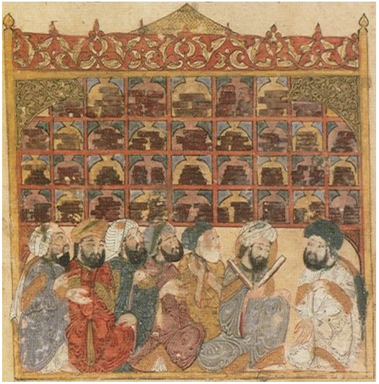 The Roots of Islamic Psychology …..”Ilm al nafs” Why do so many so-called “religious people” see mental illness as incongruous or contrary to faith? This is a question that must be addressed. These assumptions can be rooted in unjustified stigma and ignorance. Mental illness has existed in all times amongst all people. Psychology, the medical and philosophical study of the psych, soul or self, was recorded as early as 1550 BCE when depression was noted in the Ebers Papyrus. One of the earliest noted contributors was a Persian named Muhammad ibn Zakariya al Razi who was a physician, scientist and philosopher. He was noted for writing about mental illness and psychotherapy. His major works called El Mansuri and Al Hawi described many conditions as well as treatment options. He eventually became the first director of a mental health ward in a hospital. The first bimaristans or hospitals were built in Baghdad in the 9th century. Another Persian writer, Abu-Ali al Husayn ibn Abdalah Ibn Sina, more commonly known as Avicenna was a forerunner in the field of psychosomatic medicine. He demonstrated the link between changes in the mental state and changes in the body. Ali ibn Sahl Rabban Al Tabari wrote a work emphasizing the need for psychotherapy. In the 10th century, Ahmed ibn Sahl Al Bakhi stressed the link between spiritual and mental well being. By the 13th century separate wards were made available in the bimaristans for those suffering with mental disorders. These were a few of the pioneers in Islamic psychology that intersected with information of Greek origin within the learning center of Baghdad during the “Golden Age of Islam” from the 8th to the 14th centuries CE. The rest of the world was experiencing what was termed “The Dark Ages” or the “Middle Ages” which began after the decline of the Roman Empire. This was a period of cultural and economic deterioration that occurred in Western Europe. A group of scholars from China, India, Arabia and Ancient Greece exchanging mathematical, astronomical, philosophical, medical information in the learning center of Baghdad. Baghdad, which was centrally located between Europe and Asia, was a major trading spot where ideas were spread for the enhancement of civilization. References 1. Wikipedia contributors, “Timeline of psychology,” In Wikipedia, The Free Encyclopedia, 3 Oct. 2020. Web 2 December 2, 2020 2. Wikipedia contributors, ‘Psychology in medieval Islam’, Wikipedia, The Free Encyclopedia, 26 November 2020. Web 2 December 2020 3. Ayad, Dr. Amira, Healing Body and Soul, 2013, International Islamic Publishing House, Riyadh, Saudi Arabia Ameedah Diaab AbdullahAmeedah has been a mental health consumer for several years and has dedicated her lifework to improving mental health outcomes for others dealing with challenges. She has experience working directly with clients connecting them to services and teaching basic activities of daily living in New Jersey prior to moving to Atlanta. 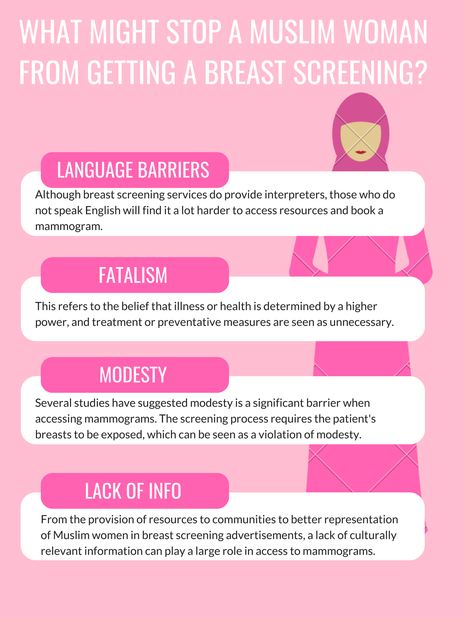 October is Breast Cancer Awareness Month and while most people know about breast cancer, with many showing support by wearing pink ribbons, it's less known that it’s the most common cancer in American women and the second leading cause of cancer death in women globally. Educating ourselves on this disease is an important aspect of breast cancer awareness. According to the American Cancer Society (ACS), the risk of an American woman developing breast cancer sometime in her life is about 12%, or a 1 in 8 chance. Further, the chance that a woman will die from breast cancer is about 2.6%, or a 1 in 38 chance. There are about 230,000 new cases of breast cancer diagnosed in women in the U.S. each year, and about 2,300 new cases diagnosed in men. The following are four key points to educate ourselves on reducing our risk for breast cancer:
Naila Abdul-Hakeem, MPHNaila Abdul-Hakeem, MPH is a Public Health Educator that has a YouTube channel called Accessing Care with Naila where she provides resources and information on ways to access health services without breaking the bank. She lives in Chicago with her husband and six-year-old cat 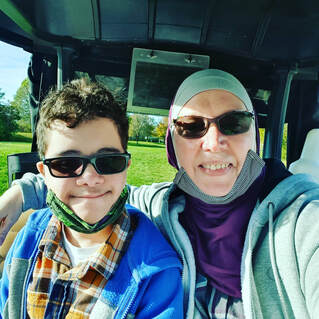 A little over twelve years ago I welcomed my fifth child into the world who happens to have Down Syndrome. It became apparent to me very early on that I would have to do more and be more to meet my son’s needs that were unique to him. If I were state side during his birth, I would have had many more options early on. There is the First Steps program that is available in each state that help children with disabilities and developmental delays. The program starts at birth to 3 yrs. and includes help with physical and developmental needs of a child. Not having access to First Steps I depended a lot on books and my own creativity to help his physical development. Some of the books I depended on early on were “Gross Motor Skills in Children with Down Syndrome: A Guide for Parents and Professionals by Patricia C. Winders” . “Fine Motor Skills for Children with Down Syndrome by Maryann Bruni” and “Babies with Down Syndrome a New Parents Guide by Susan J. Skallerup”. These were my go-to books that were well used. I was able to learn not just what to expect from my child but also how to help and support him in his development. Some of the help required my own creativity and using some simple objects for both fine motor skills as well as gross motor. At a point in his development I saw that language would be his bigger hurdle. Physically he developed about the same rate as peers his age, but the ability to speak was a struggle. The understanding of language was there but getting it out and able to express it was the problem. He would be latter diagnosed with apraxia and the tools to help him greatly changed as he grew. Early one we focused on sign language which is a great resource for any young child to express their needs and wants. Signing Time was the best resource for the whole family. There are many videos of various themes that can help a child easily communicate their needs to those around them. The downside of this is that whoever they are communicating with also needs to know sign language. As he got older, we received a communication device from his school district. There are a number of dedicated devices just for communicating. Some of these devices are in the thousands of dollars but there are programs available to help aid with the cost. But thanks to technology advancing it's much easier to buy an iPad and download an app to help a child communicate with everyone around them. There are many to choose from and much of it depends on what the child is most comfortable and what will grow with their age and ability. One of the things I decided early on is that my child will determine his capabilities. I would never limit him due to the preconceived notions of what he should be able to do. While he was younger and very active, I signed him up for sports with his typical peers. I found that most parents and other children were very accepting because, although different in some ways, he was still very much a child of their own age. As he grew and the competitive nature of his peers kicked in that is when we sought programs by special needs groups. Locally we have several such as Special Olympics, Special needs soccer association, TASK and horseback riding programs. There are many ways to get a child who happens to have special needs moving. Through the years it was vital that I also learned how my child learned. Even as the fifth child I was very much surprised how my child's diagnosis would impact the way in which he actually learned. A huge help for us was The Maren Fund. Which is an awesome program that not only assists children with Down Syndrome to learn but also teaches parents, and those who are involved with their learning, how the children actually learned. There is much research out there that shows that it is much different than their typical peers so the best manner to teach them is to teach ourselves a different approach. There are many resources out there to help aid parents with the raising of their child with special needs. Even as they age support will need to be given to them. So, it is imperative that parents seek out all that is available and be their foundation of learning and development. I cannot stress enough the importance of that foundation and the willingness to help your child to continue to grow and reach all of their capabilities. It truly starts from day one and will continue for as long as they require it. This path has been quite the blessing I will say. I have learned so much from my son in this short 12 years and I look forward to the growth of what we will both continue on. Ann TamimiAnn Tamimi wife and mother to five. Avid reader, scrapbooker and has large diy fantasies. 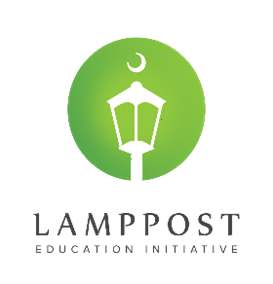 The Lamppost Education Initiative (Lamppost) is a non-profit 501c3 charitable dedicated to Islamic education for English-speaking Muslims. Lamppost provides a window into the rich Islamic tradition through the eyes of contemporary American Muslim scholars, intellectuals, activists, and leaders. We offer to the public: live and pre-recorded webinars, classes, books, essays, and onsite enrichment programs dealing with the topics of Islam, Muslims, and the socio-cultural dynamics of American society. Our contributors offer expert analysis of current events that affect Muslims in the West and offerings in the classical Islamic disciplines. Lamppost features some of the foremost scholars of Islam in America. Scholars like Dr. Sherman Jackson, Imam Zaid Shakir, Dr. Abdullah bin Hamid Ali, Dr. Khalid Yayha Blankinship, and a host of other scholars and teachers. Covid-19 increases the importance of our online learning efforts. The pandemic forced us to cancel our annual Conference-The Black American Muslim Conference-as a live event. Many masajid where Islamic classes and teaching occur are now closed and restricted due to this life-altering pandemic. This year we are conducting our Conference as an online event. Once again, Lamppost is featuring some of the most prominent Muslim-American scholars at this virtual event including, Imam Zaid Shakir, Imam Siraaj Wahaaj, Dr. Abdullah bin Hamid Ali, Dr. Jamillah Karim, Imam Fode Drame, Shaykh Khalil Abdur-Rashid, and many others. This Conference took place on October 16th, 17th, and 18th. More than ever, the Lamppost Education Initiative needs your financial support to provide more online sessions, events, and classes for Muslims in America. Khalil MuhsinManaging Director, Lamppost Education Initiative 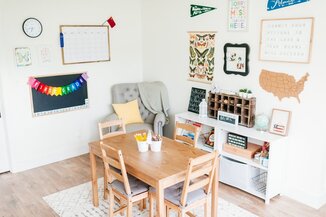 “According to a 2009 study of standardized testing, homeschoolers scored in the 86th percentile. The results held true even when controlling for parents' income level, amount of education, teaching credentials, and level of state regulation. Research also suggests that homeschooled kids get into college more often and do better once they're enrolled.”(Weller, 2016) If no one has told you, you are the best teacher for your child. You are their role model, superhero, and confidant. As you raise your protege, you always want to be their biggest influence. I am here to tell you that homeschooling is one of the best decisions you can make for your family if these are your goals. Your children will only be children for a small portion of their lives, so every moment matters. Making the decision to homeschool is an investment, that if done right will have a lasting positive impact. It will give you the flexibility to have that positive influence you are seeking. Making the Decision: As a former public and private school educator, I know firsthand the impact parents have on their children's education. It tends to look something like, the more involved the more likely it is the student will be successful in school Now how would that look if the parents were the school? As a matter of fact, Chris Weller of Business Insider stated “According to leading pedagogical research, at-home instruction may just be the most relevant, responsible, and effective way to educate children in the 21st century.”(2016). This sums up exactly why YOU should be teaching YOUR child. Curriculum: One of the most intimidating things about home school is often what to teach. Tons of highly educated gurus have already laid out a map of what each student in America should be learning from birth to 12th grade. You as the purveyor of your child’s school have the authority to choose from the thousands of options available. Kaylene of Autisticmama.com recommends you consider the following when selecting a curriculum:
Don’t make this a daunting decision, you know your child better than anyone. You also know what is most important to teach and not teach your student. Choose a curriculum that best reflects your spiritual, academic, and social beliefs. This isn’t rocket science, but it could be. Our Network: Makkah International Institute would like to give you peace of mind. Homeschooling can be overwhelming, and we are here to walk you through every step of the journey. We offer mentorship to parents who are in need of guidance from professionally trained teachers and experienced homeschoolers. Additionally we have a preselected curriculum that has been tried and tested. Families that join the Makkah International Institute Homeschool Network will be able to join us for monthly outings that support the learning goals. For those parents who do not believe that they have the time or experience to research and vet homeschool curriculum, we are offering online virtual learning that families can access from the safety of their homes. Whatever it is that you are looking for in a homeschool, we are here to assist. Feel Comforted in Your Choice: When your child is grown, successful, and content, know that you did your best. You chose what was best for them and would have the best outcomes. In actuality, you only have about a solid 13-14 years to have an impactful impression on your child, afterwards they are typically set in a mold that is who they will be for a lifetime. Increased positive interactions with parents along with decreased interactions with deviant peers are main factors that predict whether children will engage in problem behaviors such as academic failure, risky sexual behavior, and substance use (Ary, Duncan, Duncan, & Hops, 1999). If this is not enough evidence to homeschool them then know that your positive modeling will instill good manners in your child. Furthermore, the Prophet (SAW) stated that the best of us is the one with the best manners (Al Bukhari). If your child does not learn a single letter sound (which they should), it is OK because what matters most is their deeds which you can influence as their first teacher. If you are interested in homeschooling, you are personally invited to join our homeschool network which gives you the option to enroll your child in virtual classes during the pandemic with highly qualified teachers. Visit http://www.makkahinstitute.org/homeschool-network.html Ary, D., Duncan, T., Duncan, S., & Hops, H. (1999, March). Adolescent problem behavior: The influence of parents and peers. Retrieved August 22, 2020, from https://www.ncbi.nlm.nih.gov/pubmed/10087640 Kaylene. (2017, June 13). 7 Simple Steps to Choosing Homeschool Curriculum. Retrieved August 19, 2020, from https://autisticmama.com/how-to-choose-the-right-homeschool-curriculum/]poiuolp;[‘ Weller, C. (2016, August 20). Homeschooling is the smartest way to teach kids in the 21st century. Retrieved August 19, 2020, from https://www.businessinsider.com/why-kids-should-get-homeschooled-2016-8 Reshelle Abdul-Malik M.A.T.Reshelle is the editor of A Message from Makkah. She is also the administrator for Makkah International Institute. Reshelle is a masters degreed educator with with over ten years experience teaching domestically and abroad. 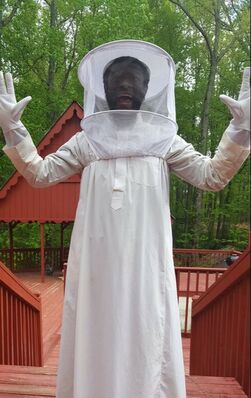 The journey of Tariq, the Muslim beekeeper began approximately three years ago. Tariq has always been a “nature boy” for as long as he could remember. As a young boy, he was the kid that stayed outdoors. His preference would be to ride bikes or play basketball than to play video games. But when friends were not around, he passed time collecting and building vivariums (enclosures, containers, or structures adapted or prepared for keeping animals under seminatural conditions for observation). Tariq first started off building terrariums for collecting and raising toads, lizards, and snakes that he would catch around the house. He then moved to aquariums where he raised various fish, crustaceans, amphibians, and turtles. It should come to no surprise that by his senior year of high school he was well positioned to go to college and major in zoology. However, due to his father cautioning him that a zoologist would not have a financially rewarding life and the school of his choice (Morehouse) didn’t have a zoology major, he chose to major in biology instead. Although he was on a pre-med track, he opted not to pursue medical school after college. Rather his secondary passion for social activism lead him to education. Tariq never strayed far from his nature loving side; in his classrooms he raised praying mantises. Shortly after starting a career as a high school teacher, he was back in the seat of the student obtaining a master’s degree in Science Education. After about 10 years as a teacher, he transitioned into Educational Leadership. Tariq currently acts as director, educator, and wellness therapist at Makkah International Institute. After founding Makkah International Institute and beginning to homestead he has now been afforded the opportunity to rekindle his childhood passion of exploring the natural world. Among other endeavors, Makkah International Institute takes regular expeditions to provide youth with real world, culturally relevant learning experiences. Among these expeditions, we have gone snorkeling, taken college tours, visited nature centers, and various farms including that of a Muslim beekeeper. It was at this trip to visit a Muslim beekeeper in 2014 that he was first introduced to beekeeping. The beekeeper saw the enthusiasm in the faces of the summer camp youth that he decided to invest in the organization by giving the organization a beginner’s beekeeping book. Tariq flipped through it, and three years later, as his homestead was steadily growing, he was ready to buy my first batch of honeybees which he purchased from another Muslim Beekeeper. The honeybees were one of the last animals to join his homestead: after the chickens, quail, and goats. After his first year of beekeeping he attended the Young Harris Beekeeping Institute and became a certified beekeeper. He is currently working on his third beehive, and plans to continue to advance in the art of beekeeping until he becomes a master beekeeper. Tariq aspires to add to the scientific research of bee related matters as well as experience being a honey judge. In addition to the personal fulfillment that beekeeping has given Tariq, children within the community have also benefitted tremendously from him being a beekeeper. Since honeybees are major pollinators, the children have gained a better interest in and understanding of agriculture and food production. Beyond honey, the children have also learned that humans collect many other useful products from bees such as wax, royal jelly, and pollen. We anticipate that we will soon have children expressing interest in going into the natural health field due to learning of the many health benefits of pollen and royal jelly. We already have children that want to make candles and cosmetic products from the wax! The youth have already gained experience in harvesting honey, this year Makkah International Institute is looking forward to producing candles and cosmetics as well! Unlike the keeping of other animals and critters, Tariq finds that beekeeping is highly connected to his religious fulfillment. The bee is mentioned in the Quran and the Prophet said that honey, black seed, and hijama are cures for all diseases and the best of all medicines. As an Islamic wellness therapist not only does Tariq perform hijama, but he also gives wellness advice on a regular basis. So quite naturally, he relays the many narrations of Prophet Muhammad that relate to wellness. If someone is sick, all too often Tariq will recommend that they take some honey. In fact, he even provides it after his hijama appointments. Which is local, fresh from the farm, and above the organic standard! After it is all said and done the number one question people ask is “how many times have you been stung”? Contrary to what most people believe, honeybees are relatively easy to manage. In his three years of beekeeping, he has only been stung about five times. Beekeeping maintenance mainly consists of opening the hive about twice a month to check the health and development of the colony. In my three years I have spent about $700 in beekeeping supplies and training. Which is about the same as a good pedigree German Shephard (without the training!). But unlike a pet dog, the honeybees find their own food. They will travel about a mile away to find the flowers they love. Makkah International Institute combines three essentials to community prosperity: service, education, and wellness. Central to our mission is the honeybee. With aw inspiring social structure and unmatched work ethic the honeybee is so central to our organization that it was chosen as our mascot. The Makkah Institute Killer Bees are steadily growing in popularity at many local basketball tournaments donning their Stealers (and honeybee) black and gold colors. Beyond summer camps and school curricula, Makkah International Institute uses beekeeping in a holistic manner to uplift our community. If anyone has any questions or need advice Tariq is always willing to lend a helping hand to the community. Till the next time, Happy Beekeeping! Tariq Abdul-Malik B.S, MAT, Ed.S, CHP Tariq Abdul-Malik is the founder and director of Makkah International Institute LLC, Makkah Institute Inc., and Makkah Farms. He is a passionate father of 9, husband, son, brother, educator, hijama practicitioner, and beekeeper. He is a staunch advocate for holistic wellness and education that balances mind, body, and spirit. 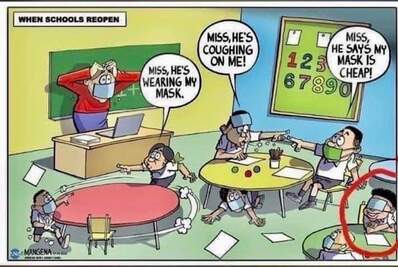 On May 19th, the CDC released guidelines for school attendance during the COVID-19 pandemic. The CDC outlined three possible scenarios and included the risks of each situation. The three scenarios included: Lowest Risk: Students and teachers engage in virtual-only classes, activities, and events. More Risk: Small, in-person classes, activities, and events. Groups of students stay together and with the same teacher throughout/across school days, and groups do not mix. Students remain at least 6 feet apart and do not share objects (e.g., hybrid virtual and in-person class structures or staggered/rotated scheduling to accommodate smaller class sizes). Highest Risk: Full-sized, in-person classes, activities, and events. Students are not spaced apart, share classroom materials or supplies, and mix between classes and activities. By late June, three schools had rolled out their fall school opening plans giving parents a choice between digital, in-person, and a hybrid model. The proposal came after both parent and staff surveys, but the announcements shocked many. The last few months took parents through the burden of homeschooling, cancelation of graduations, and the worry of keeping their children safe during a pandemic. Now parents must decide how their child would learn for the next school year with very little information as to how it will look. As we walk into this great unknown, what can we do to be prepared and ensure our children have the best school experience possible? (https://www.cdc.gov/coronavirus/2019-ncov/community/schools-childcare/schools.html) When schools closed in March, there wasn't a single parent ready for the burden of digital learning. We scrambled to keep up with assignments and understand what in the world it all meant. The parents struggled, the students struggled, and we all felt like we had fallen down the rabbit hole, hoping to return home soon. As summer approached, it felt like we were free, and our "normal" would return. We celebrated the start of summer with all the hopes school in the fall would be the same as we left it, but we approach the start of school this fall it looks like we will have to accept a new "normal." That "normal" included parents having to decide how their children will receive their education for the next school year and the reality that the pandemic is still present. At the end of June, three counties had announced their plans for reopening. These plans included Hybrid, in-person or digital options. Ready or not, our students will return no later than August 17th. With this realization, parents want to know how schools plan to keep our students and their staff safe. The state of Georgia does not require masks, but some school districts are strongly recommending it along with six feet of distance when possible. Decisions about restrictions during this pandemic change monthly, so there are still many unknowns. Districts have not given specific and definite guidelines on recess, PE, assemblies, Parent nights, etc. where crowds and distancing will be difficult. So how do we ensure our children will be safe. As a parent of elementary and a high school student and also an elementary teacher, I know that it will be hard to keep the little ones masked and apart from each other all day. It is important to make sure we implore our children to keep their safety in mind. Make sure they have personal cleansing and disinfecting materials, and keep in mind they need to stay distant from their friends when possible. Schools are not allowing sharing of materials, but children need to make sure they are not sharing personal materials like they may be used to. Just as we prepare our children for safety in any environment, we now have to prepare them to stay safe in school. Now that we have heard what the return of school may look like, how can we, as parents, ensure that our children are safe, and their educational needs are met? With information coming from every which way and changing weekly, we as parents will be our children's most important advocates. Schools will be working diligently to create environments that follow state guidelines while keeping student's academic needs in mind. Whether your child is attending a hybrid, in person, or digital format, it will be starkly different from what they have been used to. One possible concern with face to face or hybrid instruction might be the possibility of the necessary safety precautions posing an emotional an/or academic risk to a successful school year. In preparation for this possible concern, it is important to be aware of any and all safety measures your school will be implementing. Making your child is aware ahead of time can reduce any possible anxiety or fear. Knowing the school's safety measures will also help parents to feel empowered and in the know. It is important as an advocate to know what your child's academic needs are and how they will be met. It is ok to ask as many questions as you need to understand and support your child. These questions may help you understand…
Khadijah AbdullahI am am a wife mother of four and an elementary education teacher for Cobb County schools. I have spent the last four years advocating for children who have experienced adverse effects of trauma. I am a teacher trainer and curriculum developer striving to create curriculum for teachers and schools to better address students who are underserved. I am also the creative director of MACE (Muslim Advocated of Children with Exceptionalities), a group that strives to open avenues for special needs children and their families. 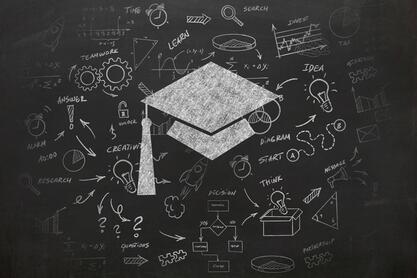 The saying “we are living in a new normal” is so cliché, yet so real. When we think about education in this new way it seems to be a toss-up. You may have a great system in place to deliver digital learning, with a supportive community, as well as a dedicated staff to support digital learning. You may have a system where summer began after March 13, 2020, or a system that is somewhere in-between the two poles. We have lived through Covid-19 digital learning of Pre-K through college level classes. As Pre-K through 12th grade administrators and governments identify reopening options, college officials are doing the same. We have a limited amount of information about what’s to come, but our students should still stay enriched and supported through this transition. We are now looking at young adults affected by this change but still striving for college and career readiness. Brick-and-Mortar institutions are now online schools, college admissions requirements are focused on something other than standardized exams, and students are continuing to question what to do with their lives. As a Georgia school counselor, I have been inundated with students’ questions about what happens next year as it relates to Dual Enrollment or college admissions. The questions are filled with nervousness of the unknown, angst as it pertains to admissions answers, and I can only respond, “I don’t have all the answers, but take a minute to breath.” Though this time we are living in is like no other in our lifetime, I suggest students continue to build their resumes and add on to their mental lexicon. Over the summer, students should try to keep their minds sharp and build their knowledge. Find a group of friends that share your interest and create a book club or watch and discuss a movie together. A recent High School graduate told me that her and a group of friends “watch a movie together” at their respective homes while using a virtual meeting medium. Students are honing in on analytical and discussion skills every time they talk about the new movie, song, or book that’s out. Become accustom to reading the paper, watching the news, sitting with the elders and understanding historical and current events. Without deadlines or teacher driven instructions, try understanding some math concepts that completely made no sense during digital learning. Learning should not have ceased because of Covid-19. College admissions procedures have drastically changed to accommodate the fluctuations in the world. The requirements are different; mandating minimum SAT or ACT scores is becoming obsolete, qualifying GPAs is still a necessity, and requiring various letters of recommendations are holding more weight. College Board is a not-for-profit organization, governing the SAT and other college success opportunities, who had to modify their exam schedule due to this pandemic; they are hoping to restart the exam schedule in August 2020 and adding exam dates more frequently. The question is, what does all of this mean for potential college students? Colleges and Universities were obligated to think quickly to ensure students could still be admitted to their Summer 2020 or Fall 2020 programs. Many of the University System of Georgia (USG) schools have begun to accept a digital version of a dissimilar college admissions test: The Accuplacer in lieu of SAT or ACT scores is now being used. Georgia Gwinnett College and Georgia State University, to name a few, are amongst the schools that adopted the Accuplacer exam (Georgia Gwinnett College, 2020). Moreover, other states are rethinking admissions criteria as well. The University of California (UC) college system declared that they will not use SAT or ACT for admissions, but instead will have students complete a new test that aligns with UC expectations (Hess, 2020). Consequently, some schools such as Kennesaw State University have taken the stance of eliminating admissions tests completely during this time. These modifications have benefits and downsides. A Georgia technical college recently contacted me stating that students can now be placed in a college level math course just by submitting an official transcript. This is significant because math placement has been based on test scores under the guise that the scores are indicative of a student that can handle higher level thinking in that subject area. This is a benefit for students who simple do not test well. These changes affect rising college students, dual enrollment students, and current students on their matriculation journey. Early last week, Georgia had ideas, but no concrete decision on how to reopen its brick-and-mortar campuses. According to the USG Fall 2020 Memo there were three Contingency plans that consider the safety of the staff and students of these institutions.
The current status of college admissions is not stagnant and can change as the pandemic changes. I encourage students to stay the course, and end the school year with a strong foundation to begin anew. If grades and GPA are a major factor in college admissions, then focus on being driven to succeed and follow your goals. Regardless of the conflicts of the times, remember your creator and set your course towards being a productive member of your community. References: Georgia Gwinnett College. (2020). Freshman admission: Never attended college. https://www.ggc.edu/admissions/how-to-apply/freshmen-no-college.html Hess, A. (2020, May 26). The UC sytem plans to phase out the SAT and ACT-and other schools may follow. CNBC. https://www.cnbc.com/2020/05/22/uc-plans-to-phase-out-sat-and-act-other-schools-may-follow-suit.html University System of Georgia. (2020, May 12). Stay safe, stay well on campus. https://www.usg.edu/coronavirus/ Madeenah Alwakeel-Dawson MEdMadeenah Alwakeel-Dawson is a certified school counselor in the state of Georgia and a Doctoral student at the University of West Georgia. She has 18 years of education and counseling experience, working with children and adults alike. For the past 6 years, she has created a counseling department at a private Islamic School in the Atlanta Metro area and has held the School Counselor Department chair position. Madeenah is a proponent of tapping into hidden potential to support individuals in self-discovery and goal setting. |
Don't miss another edition of A Message from Makkah. Click the button below to join our mailing list
Contact Us for Advertising Opportunities!
Archives
January 2023
Categories
All
Our Sponsors |
Makkah International Institute
 RSS Feed
RSS Feed